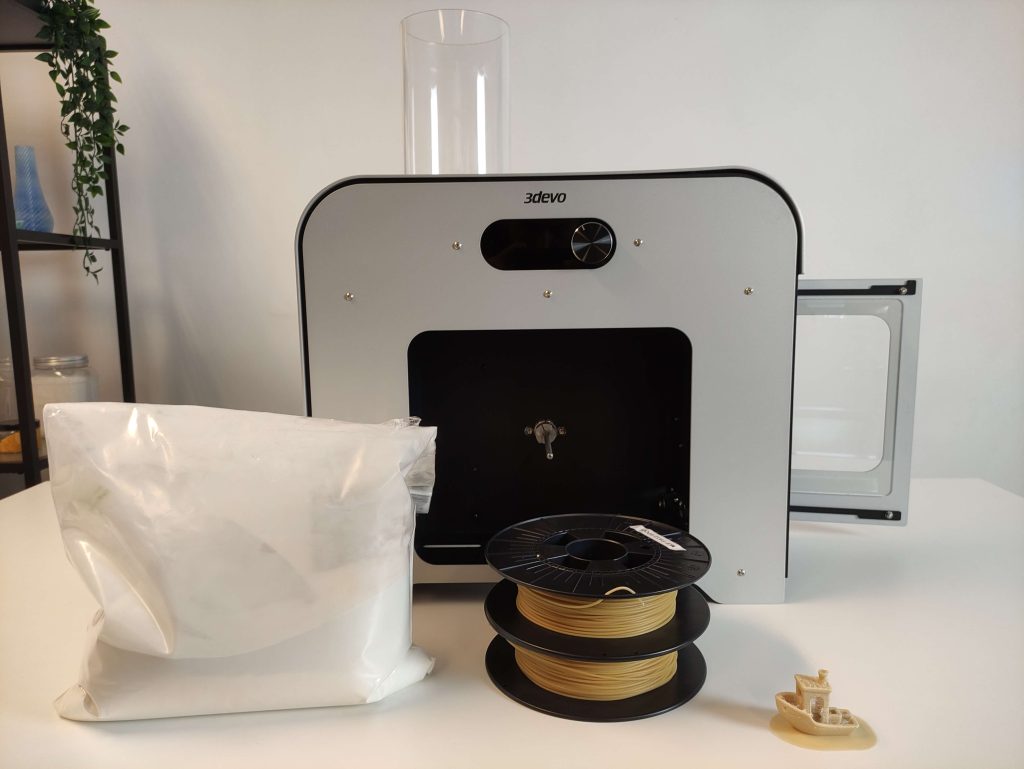Register now for our Additive Manufacturing Advantage online event for insights on AM developments in aerospace, space, and defense sectors from industry leaders!
3D printing material processing systems manufacturer 3devo has announced a new process for recycling Selective Laser Sintering (SLS) powder into high-quality 3D printing filament. This follows its decision to cease selling filament recycling equipment as part of a new business model.
Generating waste material is a major challenge in 3D printing, especially with SLS and Multi Jet Fusion (MJF) technologies, resulting in 60% leftover powder, posing significant material wastage and disposal challenges. 3devo says this development addresses the issue of SLS powder waste, potentially reducing environmental impact and operational costs for industries that utilize 3D printing.
To promote sustainability in the AM sector, the newly introduced process converts discarded SLS powder into reusable filament. Doing so offers a practical and environmentally conscious alternative for manufacturers in the aerospace, automotive, medical, and education sectors.
3devo’s recycling solutions
One of the key benefits of 3devo’s recycling solution is the potential for increased experimentation and application. By converting waste SLS powder into filament, users are no longer constrained by the high costs and limited availability of fresh powder. This enables more frequent prototyping, facilitates greater customization, and allows for complex projects that would otherwise be expensive with conventional materials.
With this novel process, 3devo tackles a major hurdle by offering a viable recycling solution, enabling industries to significantly reduce waste and contribute to a more sustainable future. The recycled filament is just as high-quality meeting the needs of various applications, so manufacturers can be confident their prints will perform well and be dependable.
A notable success story involves a new customer in the United States who had been seeking a sustainable solution for SLS waste powder for several years. 3devo’s Materials Specialists were able to meet this need, showcasing the practical application and effectiveness of the recycling process.
At Formnext 2023, 3devo launched the Filament Maker TWO and DevoJourney service. The Filament Maker TWO, an enhanced version of its filament production technology, includes advanced features for better control and precision, tailored for research, education, and production. It is available in two models: Fusion for R&D, and HighFlow for consistent production.
On the other hand, DevoJourney provides expert consultations, customized project roadmaps, and ongoing support, helping clients navigate the complexities of extrusion and 3D printing.
In 2021, the company introduced the GP20 Shredder Hybrid, a 2-in-1 shredder and granulator for recycling 3D printed plastics. Optimized for cleanability and throughput, it works with most polymer materials and features Smart settings for precise control.
Designed for R&D and small-scale production, the modular system has 14 shredding blades and can handle various materials, including composites and 3D prints. Safety enhancements include a new hopper design and smart sensors, ensuring the machine meets all safety requirements before operation.

Responsible growth by material sustainability in the AM sector
By prioritizing material and filament sustainability, the 3D printing sector can support long-term environmental health, regulatory compliance, and economic viability, ensuring its growth is responsible and beneficial for future generations.
Consequently, UK-based 3D printing filament manufacturer Filamentive launched Economy PLA, a 3D printing filament made with up to 99.99% recycled materials from post-industrial waste. Available in black and white, this eco-friendly filament is sold in 1kg spools on Filamentive’s website and authorized retailers.
Economy PLA maintains high quality and performance while reducing contamination risks. Previously, the company also introduced PLA Tough filament, made from renewable sugarcane, which is biodegradable and packaged in recyclable cardboard spools.
Montreal-based recycled filament manufacturer Nefilatek developed 3D printing filaments made from 100% recycled plastic. The company introduced Nefila HIPS Black (High Impact Polystyrene) and Nefila PC (Polycarbonate) filaments, featuring reusable spool supports and eco-friendly packaging. Derived from electronic waste in Montreal, the HIPS filament offers impact and heat resistance comparable to standard ABS and can be smoothed with sustainable oils.
Additionally, Nefila PC, made from recycled polycarbonate, features solid mechanical properties and wide temperature resistance (-50°C to +130°C), suitable for technical applications. These filaments provide eco-friendly alternatives, reducing the environmental footprint of 3D printing while maintaining high performance.
Join the Expert Committee for the 2024 3D Printing Industry Awards to help select the winners!
What 3D printing trends do the industry leaders anticipate this year?
What does the Future of 3D printing hold for the next 10 years?
To stay up to date with the latest 3D printing news, don’t forget to subscribe to the 3D Printing Industry newsletter or follow us on Twitter, or like our page on Facebook.
While you’re here, why not subscribe to our Youtube channel? Featuring discussion, debriefs, video shorts, and webinar replays.
Featured image shows SLS powder recycling using spools and Filament Maker One. Photo via 3devo.
